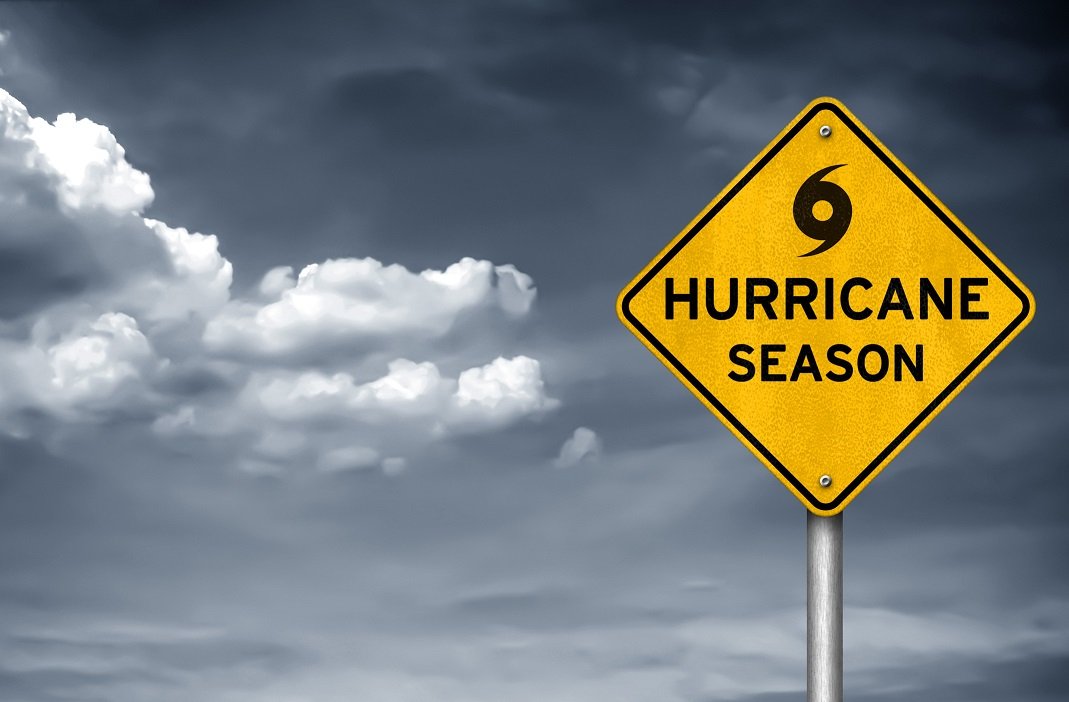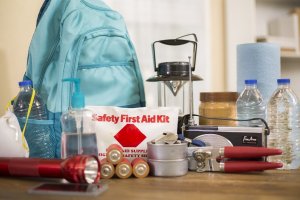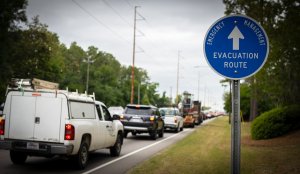
Hurricane season has officially begun, and it’ll last until the end of November for many Americans. Although we haven’t seen a major storm so far in 2022, there’s still plenty of time for a hurricane to rear its heavy winds.
Whether you live on the East Coast or neighbor the Gulf of Mexico, you need to know how to be prepared for a hurricane just in case one decides to come through your neighborhood. Planning and prepping for a major storm can keep you and your family safe before, during, and after. Here are a few crucial safety tips to remember before the next hurricane hits.
Preparing for any natural disaster is always better than being caught off guard. Fortunately, there are lots of ways you can prep your home and your family for a potential hurricane.

Emergency preparedness supplies. A large collection of supplies to be used in case of a natural disaster (hurricane, flood, earthquake, etc) including flashlight, backpack, batteries, water bottles, first aid kit, lantern, radio, can opener and mask.
Your home and your car should each include one emergency supply kit. Emergency supply kits typically include medical essentials like:
Buy two kits and put one of them in your car. That way, if you need to evacuate in a hurry, you’ll still have a kit on hand to deal with accidental injuries if you forget your primary kit at home.
Be sure to charge up any personal electrical devices in your home, such as phones and laptops, then unplug them from the walls. Put your devices on battery-saving mode since you may not be able to charge them in the near future. Power outages can be very common during hurricanes and other natural disasters.
Even better, try to pick up a few spare batteries, a car charger, or charging packs for those devices. For example, if your phone runs out of battery but you need to contact a family member, you can plug it into a battery pack without having to plug it into the wall outlet.
Depending on your location, you might be required or recommended to leave your home in the event of a hurricane. So, you should prepare your car ahead of time by:
If you are not using your vehicle to evacuate, then another safety tip for hurricanes is to find a safe place to keep your car during the storm. The best places to park your car in advance of a hurricane are in your garage (if there isn’t any obvious debris likely to block your exit) or under another type of cover. However, don’t place your car under a tree or power line, both of which can fall under hurricane-level winds. You’ll save yourself a ton of money – and a headache – by avoiding this easy mistake!
There’s a big difference between hurricane watches and hurricane warnings; to be prepared, you need to understand both so you can follow the recommendations of your local government or emergency services properly.
A hurricane watch means that hurricane conditions, including sustained winds of at least 74 mph, are possible. Hurricane watches are typically announced 48 hours before tropical storm-force winds begin.
A hurricane warning is much more serious. It means that experts believe hurricane-force winds will almost certainly arrive in a given area. These are usually issued about 36 hours prior to tropical storm-force winds arriving.
If there is a hurricane watch in your region, it’s a good idea to prep for a storm just in case. If the hurricane watch becomes a hurricane warning, it’s time to batten down the hatches and possibly evacuate the area.
If you and your family are usually spread out or work at different locations around town, create an emergency plan and practice it regularly so that you’ll all be prepared for the next big storm that comes through. Your emergency plan for a hurricane should include:
It might seem like over-preparation, but it can make communicating and connecting with your family members much easier in a crisis!
If you have pets or farm animals, you’ll also need to get them ready for an upcoming storm. For starters, you should microchip all your pets. Make sure they’re fitted with collars that include identifying information as well.
When a storm starts, crate your pets so you can easily put them in your car if needed. If you have to evacuate ahead of time, try to plan a safe place for your pet to stay or find accommodations that allow pets. It’s much better to take your pet somewhere else and retrieve them after a storm has passed than it is to leave them behind in a potentially dangerous area.
During a hurricane, water lines might go down. To make sure your family has enough drinking water, fill up your bathtub with clean water prior to any tropical storm. Similarly, find any empty jugs or clean containers in your home and fill them with fresh water, too. You never know how long water outages can last and how much water you may need to use for a prolonged outage.

Set of long storage term mostly dry sweet energy foods on pantry shelf on brick wall background
When it comes to preparing for a hurricane, you should do the same thing when it comes to food. Disasters can easily disrupt food supply chains, and even if you could theoretically get to a grocery store in a storm, there’s no guarantee that your local supermarket would be open or have what you need during a hurricane.
You should pick up food that:
If you have enough prep time, consider boarding up your windows and doors with planks of plywood or other strong and resistant materials. Covering your windows and doors can protect the inside of your home and your family from shattered glass in the face of hurricane winds, or your furniture becoming ruined from incoming rain.
For even better protection during a hurricane, you can install storm shutters or get your house fitted with impact windows. Storm shutter renovations are well worth their initial cost, and you can always get help financing these upgrades.
Take a quick walk around your yard and pick up any debris, tools, or other things hurricane-level winds could pick up and throw against your home.
Lastly, don’t forget to check the battery for your carbon monoxide detector! Many people don’t consider the risk of CO poisoning in the face of a hurricane (for obvious reasons), but it can be very dangerous when multiple people stay inside with no open windows for hours or days at a time.
Prepping for a hurricane is always wise, but you might be forced by circumstance or surprise to stay at home during a hurricane. You can keep yourself and your family safe with some smart tips and logical precautions.
First, always follow the guidelines of what emergency services recommend. If they say you should evacuate, it’s always a good idea to do so, even if it’s difficult or you worry about your property or pets.
Next, never venture outside while a hurricane warning is still in effect. Even if it looks calm, sudden and very heavy winds could pick up and endanger you in a matter of moments. Stay indoors unless absolutely necessary.

The man switches the news channels on the remote control on TV.
Try to keep a TV or radio on during a hurricane. This is the best way to know the earliest that it’s safe to go outside or let your pets outdoors. It will also help keep you prepared for a hurricane by informing you of any potential dangers to be aware of that you may have not yet experienced.
Store your emergency kit at a place where you can easily reach it, even if your house sustains damage. The best practice is to keep it with you, whether you plan to hunker down in your living room, bedroom, or elsewhere.
You should always stay away from windows. Windows, even if shutters or boards protect them, are structural weaknesses. The best place to be during a tropical storm is the place in your house with the fewest windows, often near the center of the home, to wait out the storm.

Cars at a standstill during a hurricane evacuation.
Above all else, the most important hurricane tip is to be ready to evacuate at the earliest opportunity. Hurricanes can last for days, and emergency services or your state government might recommend that you evacuate prior to or during a calm period of a storm.
Ultimately, the best way to stay safe during a hurricane is to not be there when it lands! That’s why you should prep ahead of time. That way, you can do a lot to minimize your risk and property damage once the storm hits.
The information and materials provided on this website are intended for informational purposes only and should not be treated as an offer or solicitation of credit or any other product or service of Regional Finance or any other company. This website may contain links to websites controlled or offered by third parties. We have not reviewed all of the third-party sites linked to this website and are not responsible for the content, products, privacy policy, security, or practices of any linked third-party website. The inclusion of any third-party link does not imply any endorsement by Regional Finance of the linked third party, its website, or its product or services. Use of any third-party website is at your own risk.
Sources accessed – 6/22/2022
CDC.gov – Preparing for a Hurricane or Other Tropical Storm
National Ocean Service – What’s the Difference Between a Hurricane Watch and a Warning?
CDC.gov – Pet Safety in Emergencies
CDC.gov – Food and Water Needs: Preparing for a Disaster or Emergency
You can prequalify for your personal loan online in just minutes by clicking prequalify now. Or, if you prefer, call or stop by your local branch to get the process started. Our loan specialists can answer any questions you may have such as what a personal loan is, understanding personal loan interest rates, and how to qualify for a personal loan. We’ll help you fill out an application for the type of loan that fits your needs.